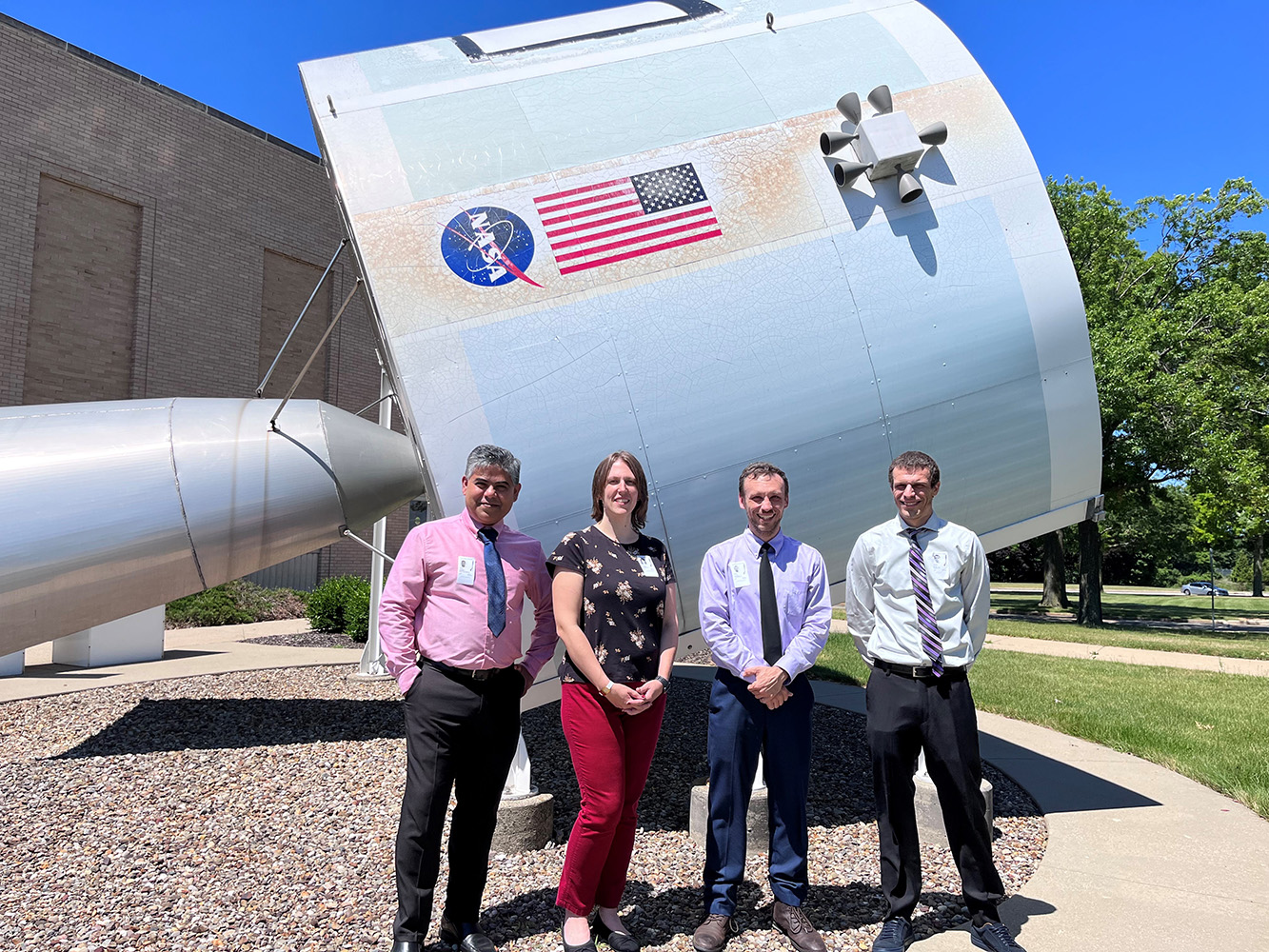Fayetteville State Student Research Team Presents Winning Design in NASA’s University Student Design Challenge 2021-2022

NASA Design Competition winners (l to r): Dr. Sambit Bhattacharya, Laura DeSantis, Chris Arsenault and Kyle Schultz at NASA’s Glenn Research Center.
Fayetteville, NC (July 29, 2022) Students from Fayetteville State University (FSU) and North Carolina State University (NCSU) joined forces in NASA’s University Student Design Challenge 2021-2022 to develop artificial intelligence (AI) driven, multifunctional, lightweight and more efficient heat management systems to help meet NASA mission needs. With advancements in electrical aviation reaching new heights, a need for such structures is more prevalent than ever.
Two FSU students, Laura DeSantis and Kyle Schultz, and NCSU student Chris Arsenault, along with their FSU faculty advisor, Sambit Bhattacharya, Ph.D., a professor in FSU’s Department of Mathematics and Computer Science and director of FSU’s Intelligent Systems Laboratory (ISL), traveled recently to NASA’s Glenn Research Center in Cleveland, Ohio, to present their winning project: “Improving the Design of Heat Exchangers with Artificial Intelligence.”
“It’s been extremely rewarding and exciting to mentor this team throughout this process and see them engage with NASA scientists and engineers creatively and innovatively to help address genuine, specific challenges facing NASA,” Bhattacharya said. “Their curiosity, drive, tenacity, and intellectual agility in this challenge have been inspiring, and they have earned and deserve this honor. I am so pleased to have served as their faculty advisor, and I look forward to opening these research opportunities to more students.”
Arsenault and Schultz are both veterans and have known each other since their service days. DeSantis and Schultz are research assistants in the ISL with Bhattacharya and are supported in their work through his grant from NASA’s Minority University Research and Education Project (MUREP) Space Technology Artemis Research, or M-STAR, initiative. The M-STAR initiative awarded cooperative agreements to seven minority service institutions (MSIs) in 2021 for projects to support NASA’s Space Technology Mission Directorate (STMD) to pioneer new lunar technologies. Nearly $3.5 million was distributed to seven select universities over two years — FSU received nearly $500,000 of that funding.
When the team’s project was accepted, they partnered with NASA scientist Dr. Ezra McNichols and spent the next several months collecting data, developing and testing software, consulting regularly with their NASA liaison and preparing to present their work. Winners were announced in April 2022, and winning teams were hosted at an event at the NASA Glenn Research Center (GRC) in June. Teams also made their winning challenge presentations to an audience of GRC senior leadership and personnel, including subject matter experts, summer student fellows and interns, and faculty fellows.
“FSU’s renowned faculty are the best in their fields and dedicate themselves to creating incredible opportunities for their students,” said Monica T. Leach, Ed.D., provost and vice chancellor for academic affairs. “Dr. Bhattacharya is a gifted investigator and impactful teacher. Opportunities like these give our students unmatched experiences and further prepare them for whatever their future may hold. We congratulate our winning team and commend all our researchers for their efforts and dedication.”
DeSantis is currently pursuing a remote internship this summer with the Naval Research Lab (NRL) in Washington, D.C., the US Navy’s premier laboratory facility. Schulz has plans to establish a business startup and is considering pursuing a Ph.D. in physics.
This is the fifth year that NASA has sponsored the University Student Design Challenge and the first time FSU has participated. NC A&T State University also won in the Compressor Development for Exoskeletal Turbine-Based Combined Cycle (TBCC) Engine category.
About Dr. Sambit Bhattacharya
Sambit Bhattacharya, Ph.D., is a professor in the Department of Mathematics and Computer Science and director of FSU’s Intelligent Systems Laboratory. He has taught computer science at Fayetteville State University since 2005. His research interests are in machine learning, computer vision and their applications in robotics and geospatial data analysis. He teaches in these same areas, including introductory programming and computer systems. His research and education program development efforts have been supported by grants from the National Science Foundation, the U.S. Department of Education, the National Geospatial Intelligence Agency, and the U.S. Department of Defense. Dr. Bhattacharya collaborates with scientists at research laboratories of the U.S. Department of Defense and works with industry on applied research projects. In 2017 he served as Faculty in Residence at Google Inc., Mountain View, California.
